Insider Briefing of 15 July 2021
Can direct action by local business save America's water? What combination of technologies could make it possible? We explored it in the briefing and what is fueling the explosive trend driving our Texas Progressive Water company's orders through the roof!
QUICK LINKS
- We welcome the Water Philanthroinvestors to the Second Water Revolution.
- If there is a Second Water Revolution, what was the first?
- Can one company do the whole job, and how is it designed?
- How is the Second Water Revolution layered and what ARE the layers?
- Tom Marchesello reports on Flint, MI (he's there!). What's the true story?
- Why PWT is ON FIRE with exploding orders and unprecedented demand.
- How supply chain issues, the "Buy American" order and the rising ESG trend are all working in Progressive Water's favor.
- OriginClear's investment offers and how to participate.
Transcript from recording
Introduction
Riggs Eckelberry:
And good evening, everyone. Once again, I tell you, the excitement never wears off. I look forward to this show all week long and we work hard. We almost time our company to this strange Thursday night, 8:00 PM Eastern. You kind of started and how do you change it? Which is why we have to replays, which is good.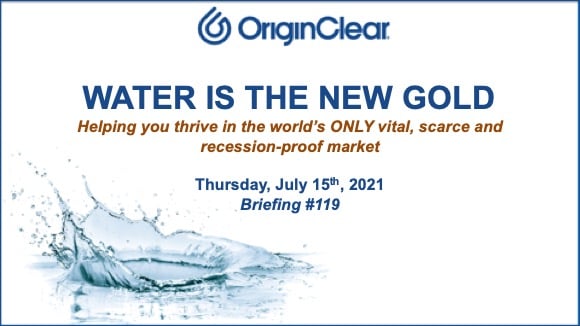
Anyway, welcome everyone. As people are streaming in, it's going to be a wonderful show. I'm going to start with the honors right now and let's get it on. So again, Water is the New Gold and the world's only vital scarce and recession-proof market, and that is for sure, July 15th and it is briefing number 119 for what that's worth.
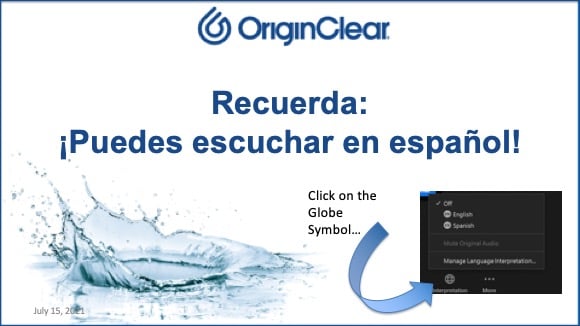
And of course, [foreign language] you can listen in Spanish on the bottom of your dialogue there's a globe, and you just select Spanish and you're in it. And I understand that we have some Spanish speaking people, so that's wonderful. I'm going to adjust my microphone here a little bit. So it's a bit closer. There we go.
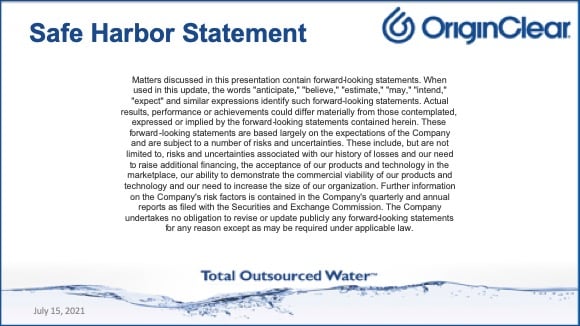
All right. Safe harbor statement of course, you know the drill that we of course do our very best to tell you exactly how it is, but the actual eventual outcome may be different from what we say.
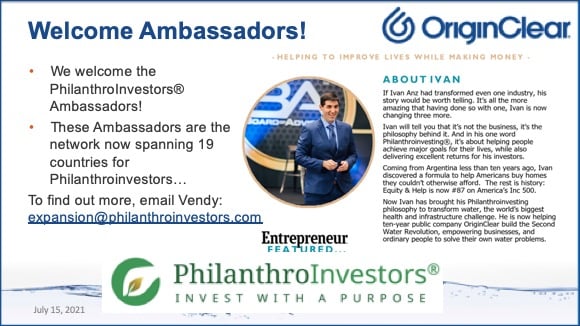
Powerful Partner
All right, right away I want to welcome the ambassadors, PhilanthroInvestors® ambassadors. And our partner, PhilanthroInvestors is amazing, and it is... was founded by Ivan Anz, right here, you can see his picture. And he built an amazing real estate play to help Americans buy homes they couldn't otherwise afford. They ended up number 87 on the Inc. 5,000.
And now he's doing it in water, so he's helping us tremendously and Ivan and his CEO Arte and the VP of expansion Vendy, have put together an ambassador program where you can be involved as an ambassador for PhilanthroInvestors, our partner in the U S and in the world. All you need to do is email expansion@philanthroinvestors.com. So that is a word from our fantastic partner.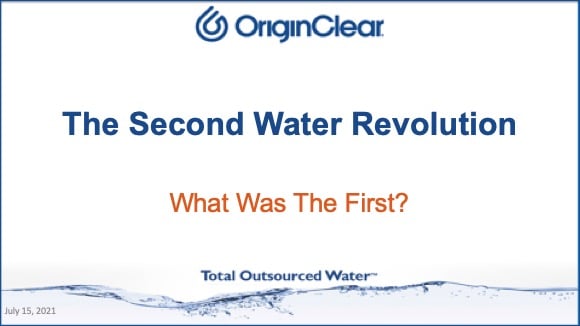
Water Revolutions
I'm going to jump right into this thing about the second water revolution. Before we get to the second one, what was the first? And those of you who caught this morning's CEO update know a little bit about this, but let me talk a bit further. First of all, not everybody gets emails these days, so let me not assume.
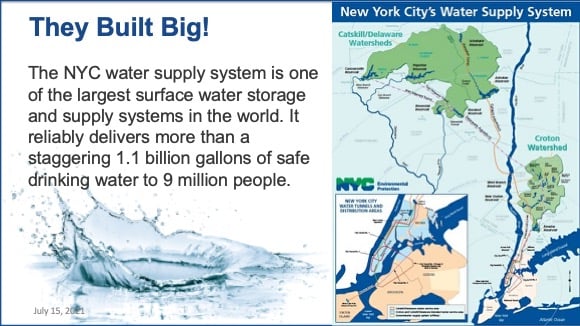
Big Systems
The first revolution was really when people built huge systems. The best example was the New York city water supply, what I used to call the Delaware system. But it's actually much more than the Delaware river, it's the whole Catskills, the Croton watershed, and all delivering vast amounts of water to New York city.
You can safely say that New York city would not exist today without this water system, it's amazing. And well-protected also, they've taken great care to keep these watersheds, a watershed being a source of water, from being polluted and damaged. And they even had their own special police to make sure there's no people putting LSD in the reservoir, that kind of thing.
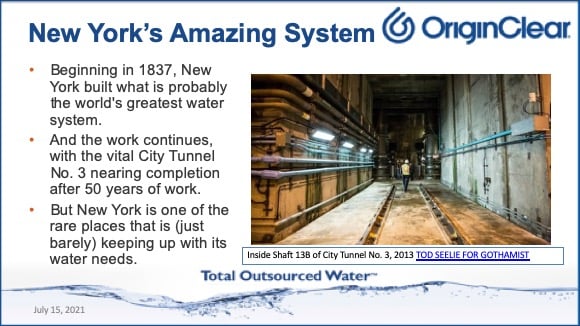
Amazing Feat
And it started in 1837. Right now they're building tunnel number three, which has taken 50 years to build, here's a picture of it. And it's an amazing feat of architecture, and once they build city tunnel them number three, they can finally, after I think, 83 years, get back to fixing number two, number one. So it's quite a huge thing, and it's largely, of course, invisible.
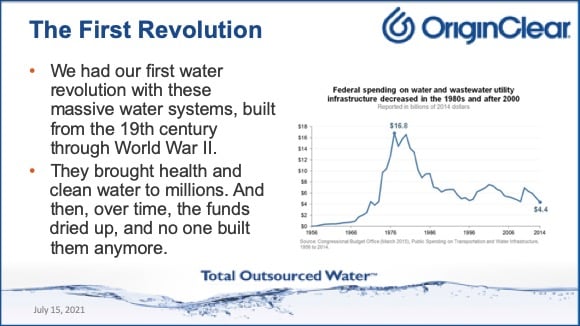
Loss of Funding
Here's the problem. New York is one of the very few places that has this going on, because in this first revolution, we had these massive water systems, but the problem is, is that we all kind of lost track and starting in...
Really you can see that the peak of federal funding was 1976, but in fact, the infrastructure projects started disappearing in 1960 onward. And it's gone all the way down to less than 9% of the budgets that these cities have. So it's no surprise that a city like Compton ended up with brown water, because they just couldn't get the funding.
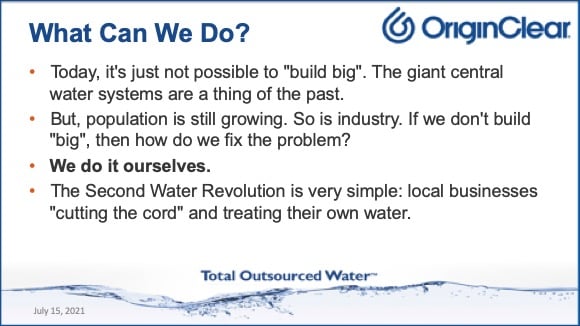
Do it Ourselves
That's where we stand today, so what can we do? Well, we can't build big, right? Why? Well, think about it. For example, Fort Lauderdale has a... no, I apologize. Miami-Dade county, which is a big, big sprawling county, was built without a lot of sewage, and so they have over a hundred thousand septic tanks in the county boundaries, and these are starting to cause big problems.
I'm not going to get into the problems, but poop in the yard, that kind of problem. And so the city... the county said, okay, we'll spend $6 billion. Well, first of all, you got to find the $6 billion. Number two, imagine trying to run sewage lines out to these, incredibly distant, individual, rural or suburban residences. This is going to take 20 years, tear things up and meanwhile, the problems go on.
Well, the solution is to do it ourselves. For example, in that specific case, those septic tanks would be replaced by self-contained water treatment systems, and it'd be funded by a rebates, much, much cheaper, perhaps one 10th or less of that $6 billion budget. Anyway, the point I'm making is that self-reliance the do it yourself movement and water is growing fast. And for us, we deal with that at the business level.
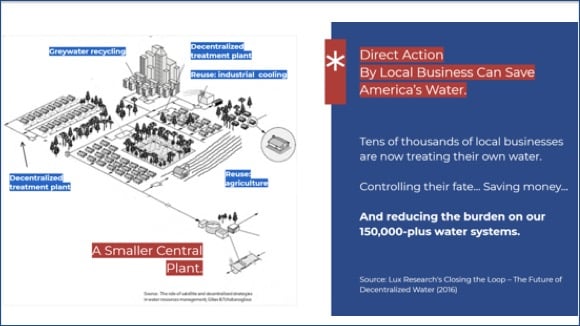
Decentralization
Here's a couple of slides from the presentation we have on our website. But basically, the idea is that if you build all these decentralized treatment plans, then you can have a smaller central plant. And you've now made it less of a problem to have infrastructure investment. So that is decentralization and it's happening right now.
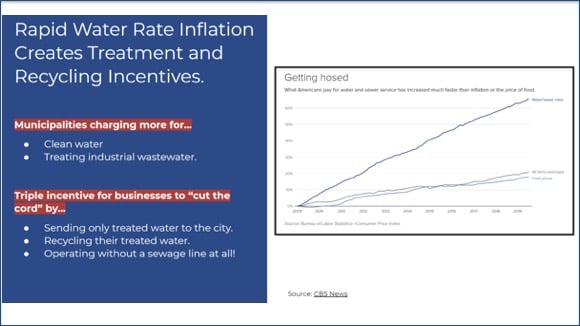
Cutting the Cord
What is one big reason for it? It's about the money. Why? Number one, they... the municipalities are charging more and more. So these companies, businesses would like to cut the cord by only sending, treated water to the city. Recycling treated water, so they don't have to pay for that more and more expensive.
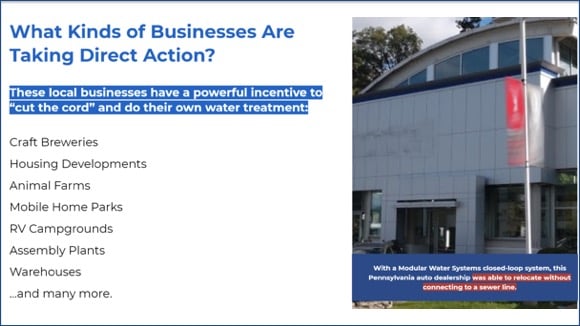
Getting Off the Grid
And finally, they don't have to have sewage line at all, which for example, this example of this dealership in Pennsylvania, not far from where Ken Berenger is based, actually. They went ahead and used our system to relocate off the grid, and we're doing a lot of business with mobile home parks, RV campgrounds, you name it. Housing developments. You can now put a 200 home housing development on a hill somewhere far away from sewage and just have it be self-contained. So that's huge.
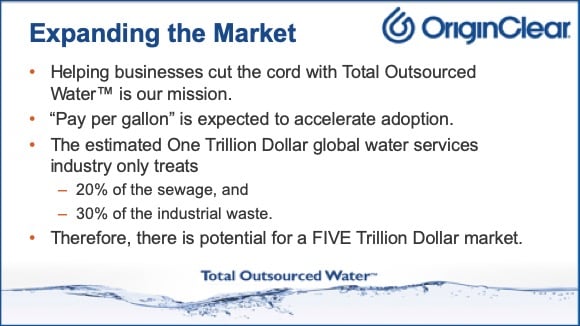
Total Outsourced Water
Now. So our mission really is, as you know, to help businesses cut the cord, increase something called Total Outsourced Water. What is that? That's where the business does not have to pay upfront. Let's imagine that you're a brewery and you've the city says, no, you've got too much, too much beer effluent, we're not going to take it anymore. And so you build your own system.
The problem with that is that breweries aren't typically funded to do water projects, they're typically in the business of making beer, so there's a lack of capital. I've spoken about this before. So we really are dedicated now to providing these machines, but this brewery, all you have to do is sign a service contract, pay per gallon just as if they were paying the city, but now they're paying us. We become a private utility.
Okay. Now, what does that mean? If we can accelerate adoption of water treatment at the business level, at the community level, we can take, what is it? $1 trillion industry, and which is only treating a small percentage of the total dirty water and grow it potentially as much as five times its size.
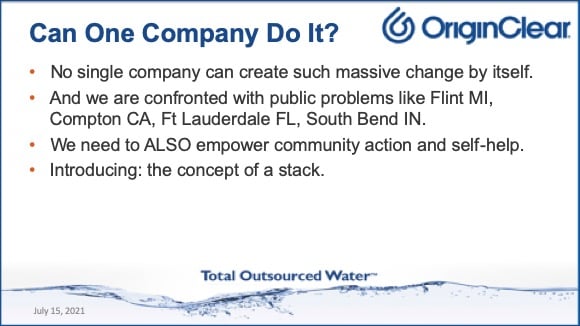
Designed to be Independent
Now, the question immediately is, can one company do it? I don't think so. So no single company can make all this massive change happen by itself, which is why we've designed Water On Demand™ to be independent of our own ability to treat water systems.
At OriginClear Corporate, of course we use our own brands, Modular Water Systems™, Progressive Water, but if they get overwhelmed, we have other water companies that we are close to, that we're building strategic relationships with. And so as long as we're funding these things, we can get them done. That's great.
But in addition, there's these big problems that I hear about all the time, "Riggs, what are you doing about Flint, Michigan?" I was involved, you saw the coverage last week about this big thing that I worked on in 2019, which was Compton, the brown water in Compton. And then we keep hearing about Fort Lauderdale's problems, and one thing that nobody hears much about is terrible, toxic water in South Bend. Okay.
Well we can't do anything about these because who's the customer? These things are typically unfunded. Or, they are of a nature that is just not our business. So we need to also put in place community action, I've been talking about that.
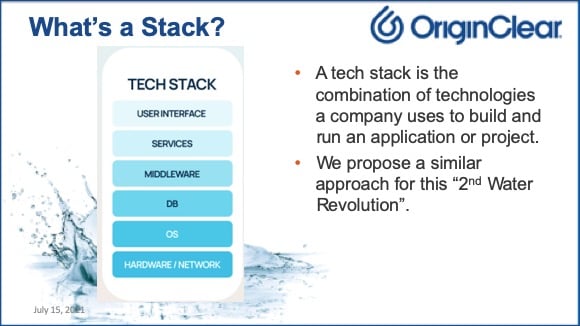
Tech Stack
Let me talk about something called a stack. As you know, I came out of high tech and we have this thing called a stack. In the tech world the tech stack is a combination of these technologies that basically layer on top of each other. So you start at the very bottom with the hardware, the metal as they call it, and you go up through the operating system, the database, the middleware, which is the connection between the database and the services. Let's say, for example, you have Amazon
Provides a big database in the cloud, but then people run services off of that and they're connected by middleware. And then finally you have the user interface, which is what people see. All right. So that is the layers you have to have to build what you might call an ecology. And this is the ecology of tech. We are looking at doing a similar thing for water. Now, this is a very early and quick look that I'm giving you, but this is where our thoughts are going.
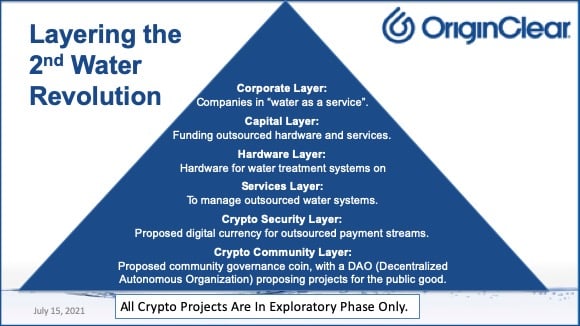
Crypto Layer
At the very base of this water stack is what we're calling the crypto community layer, this is a cryptocurrency that we're working on. Please don't take this as gospel because it's extraordinarily sensitive with regulators. So we are not advertising we're doing this yet, this is totally being explored. But I can tell you that we're exploring it very seriously. We're meeting with lawyers and developers and a lot of our time lately has been spent on this.
Base Layer for Water
What this is is our vision of a coin, of a cryptocurrency that enables something called a DAO, decentralized autonomous organization. That is something that exists to decide how money will be spent by this community. It is not directly to help OriginClear, rather we see this as a base layer for everything that's done in water all over the world.
Security Layer
Now, on top of it, there is something that we do and we want to do, which is what we call the crypto security layer. I've been talking to you about the ways to pay out dividends to investors using a specific kind of coin. You might call a digital currency, I won't get into the terminology. But that very definitely is something we have in our plans. And it is less sensitive because it is clearly a security, meaning that only what's called accredited investors are going to be receiving that.
Community Layer
The community layer, that's much more complicated and we cannot tell you that it's not going to be a security. So again, you have to think of that as being something we know has to exist, there needs to be something at the base layer. What the actual structure of it's going to be, we shall see.
For example, we've discussed that perhaps this could be called the waterpreneur layer. Remember how we had Water as a Career™ and the water industry is aging out and it needs more people, and maybe we put people to work. So maybe that's a water service layer, water as a career? This is just to tell you that it's still very fluid, but it's happening very quickly.
Top Layers
Now, on top of it, you have the services i.e., managing these outsource water systems. And then on top of it, the hardware, which is... Looks like a few words got missed there in that thing. But basically these are water treatment systems being used for the pay per gallon model that we're talking about. And then, of course, on top of that, you have to have the capital to fund these hardware and service layers. And on top of that, you have the companies like OriginClear and potentially others who are doing this water as a service activity.
Our Vision
So this is kind of what we see as the second water revolution. What we're enabling here is self-help by really everybody concerned. At the very base level, this community is like, "Everybody in the world can participate." That's our vision anyway. The second layer is this interesting creation of a water marketplace perhaps with this digital currency, again TBD, to be determined. And then the services being all that billing for the pay per gallon, the meters, the sensors, and all that stuff. Moving up into hardware that is specifically designed for this activity.
Remember that Modular Water Systems is designed to be roll in, roll out. And so you can deliver it and then if the customer stops paying the pay per gallon contract, it can be taken out. So it's a very specific layer for this self reliant water treatment.
Capital again, is raised by these companies, we're doing it ourselves. We have a $20 million private placement specifically to fund the Water on Demand project. And that money is in a special subsidiary safeguarded in many ways, and used only for these hardware investments. And then finally, of course, these new age companies, of which OriginClear is a leader.
Concept Isn't New
Now, water as a service is not new. In fact, I'm putting it in quotes, why? Because it is a trademark of another company. But that other company did water as a service for very large projects like a desalination system for an entire island.
Water as a service for smaller localized businesses is brand new, it's considered hard right to do because it's just as much trouble but it's less money. So the large water companies are not really jumping into this, what I think is the real growth area and is proven by the trends. There's a tremendous growth going on. And so it's the growing space and the old water companies don't want to play in it, which creates an opportunity for me, in my mind for us that is.
Shrinking of Big Companies
So there's a very important book called The Innovator's Dilemma. In that book, it traces the evolution of industries such as the disk drive industry or the dirt digging industry, various different industries. And each industry the next player that destroyed the previous generation company, that previous generation company could not afford to do the next thing like the smaller disk drive because they wouldn't make as much money, and so literally they were destroyed by it.
So what I think is going to happen is we're going to move towards a shrinking of the big central water companies over time as infrastructure shrinks and a growth of these local water companies, and they're getting more important. This has been predicted as a trend by Global Water Intelligence, GWI, for gosh, six, seven years now they've been saying this is going to happen.
Uniquely Qualified
So that's what I'm going to get into on this. But you can tell that we need a design and this is starting to come together and to make sense and we can really honestly think of it as a revolution because I nobody's been thinking about this to date.
It's because of our amazing investors and the team we have that we were able to persist through all the learning experiences we had, including all that first crypto effort in 2018 that gave me nightmares for a long, long time.
But as they say, experience is a great teacher, it just sends in big bills. So we learned so much from that, and I think that makes us uniquely qualified for imagining and ultimately building this system.
There's going to be much more on this, you're getting a first look, it's very informal. And again, remember that we're not promising that there's going to be particular kind of coins done. I'm not even going to get into the terminology, what is let it be for now. But that's how it is, and we'll be happy to discuss it further.
Ken Berenger whose name I will give to you shortly, his contact info, is deeply involved with this. He was a co-inventor on our $H2O™ coin, and he's very, very much up to speed on this. So stay tuned.
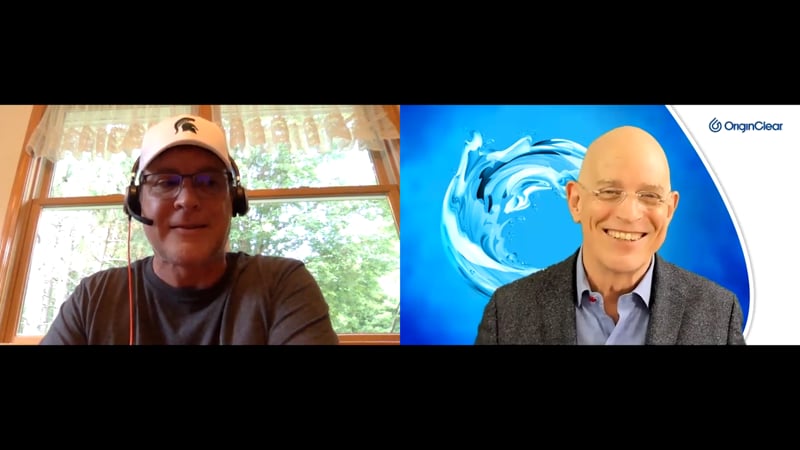
A Flint Issue
All right. Well, with that, I'm going to move to some amazing stuff that's going on in Progressive Water Treatment. And Tom is here, my main man.
Tom: Oh, yeah.
Riggs: Boom.
Tom: Hey, do you see my hat? That's Michigan, baby. Pure Michigan right now. That's right. And my shirt is of course The Bucks. So what's a guy from Florida, Tampa doing up here in Michigan? And the truth is I'm here for summer to see family, my wife's family. But we did fly into Flint, Michigan the other day.
And your lead in, so incredibly accurate because as we fly into Flint, Michigan, we get here off the plane and we're hungry of course. We were like, "Oh, let's go to dinner." And everybody's like, "Oh no, you don't eat in Flint because of the water because it gets it in the food." And it's like, it's so sad.
Riggs: It's terrible. You can't literally go to a restaurant.
Tom: Yeah. It's this continuing saga of pain and suffering for this community in that area when you think about it. And it brought me to just research it too just because we always hear about Flint's still broken but Flint was fixed. But it's a separation of the two topics. And the people here on the ground gave me a much better understanding of what it means to have a Flint issue.
Dated Back to 1901
So what happened was 2014, '15 is the beginning of the Flint saga where the city essentially decided to save some budget. So they cut away from Detroit
Riggs: $500 a day. That's what they saved.
Tom: Yeah. And they were going to cut away from the City of Detroit water system where they were receiving their water, which was properly cleaned. And instead they tapped into the river, the Flint River. So the Flint River unfortunately didn't properly treat that water then provided to the residents.
So then not only was it laden with chemicals and metals and bacteria, but then also they added the additives to it, which were these chemical additives which helped accelerate the corrosion of their corroded pipes.
Now, their corroded pipes dated back all the way to 1901 to 1920. So the pipes you're actually dealing with that were in the ground in Flint were actually that era that you just talked about, 1901, and that's all over America really.
Replacing Pipes
Iron pipes and cast iron pipes and stuff. So what happened with those, they corroded over time, got full of lead, got full of bacteria and biofilms, which we've talked about in the past. And so now the city eventually switched back to Detroit water again, away from the river.
So they've removed water source problem. However, then that left them with the replacement problem so they've gone through and literally gutted miles and miles of piping and replaced all the old piping with the PVC plastic oriented pipings.
Now that you have now new source water and you have new piping in the ground, but yet the water is still bad in some areas because now you have the last mile issue of street to house and the actual houses are still old pipes, galvanized steel, lead pipe, all this other stuff. It is the story that keeps on giving in this saga, which is an interesting point of time, but I thought it was worth looking at because it's so relevant to everything we keep talking about. So anyways-
Worse that People Think
Riggs: It's so true. Well, It's amazing that you're there actually in-
Tom: I am actually there.
Riggs: The eye of the storm, so to speak.
Tom: Eye of the storm.
Riggs: But in many ways water is worse off than people think and they know it's bad, but it's worse.
Tom: Yeah. It's bad.
Riggs: The real problem is that nobody's allocating money. For example, the Biden administration was proposing $110 billion, that's been cut to 55 billion, and we think that roads, bridges and broadband access are more important than water. It's completely ridiculous. Those things are important, but if you don't have broadband access, you won't die.
Tom: Yes. You can only last about three days without water.
Riggs: Exactly.
Tom: Broadband, I can do a month without, I'm all right.
Riggs: Wait a minute. What about Netflix? Come on, dude.
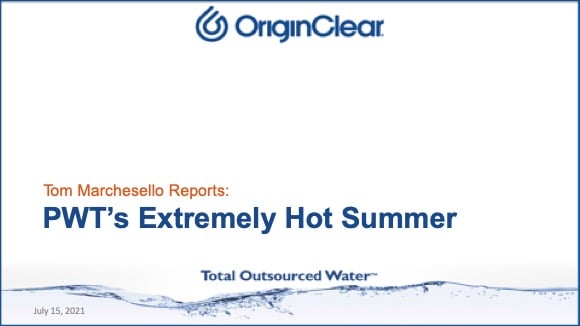
Kicking It
Tom: Well, yeah. Anyways, so let's get onto some great news. The team's really been working hard and we've had some wonderful updates the last couple of sessions where Dan Early and his team we're kicking it out of the park.
And then obviously we've been continuing our efforts with the PWT team out of Texas and Marc Stevens and Mike Jenkins and the guys are just really hitting their stride too. We've just come off of a really interesting series of very heavy workload. We were just so busy for the beginning of the year until now with lots of projects moving through the pipe and out the door.
We had a nice finish on the Q2 there with some of the projects that we were excited about. And what got real interesting is as we headed into the summer, Mike Jenkins, our head of sales, which I think you have a photo of him is, really been lining up a nice pipeline, really working the channels, people that we've worked with in the past, as well as some new opportunities that were coming in. And it's really... We nailed it. We had some really strong proposals that turned into purchase orders, and we're going to talk about it.
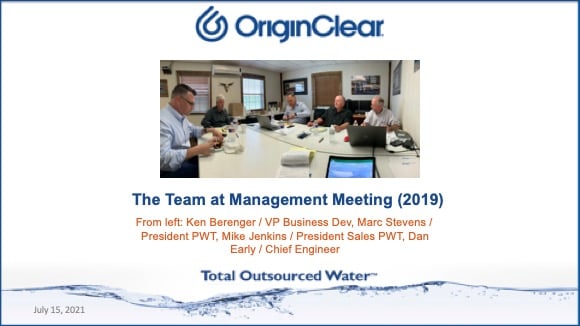
Who's Who
Riggs: And we have some specifics. First of all, I want to put some faces to the names. Remember this 2019 meeting? May 2019 and-
Tom: Oh, my God, that was the best barbecue ever. Mike got it for us.
Riggs: Oh, it was so tasty. From left, we have Ken Berenger, who's our VP of business development, Marc Stevens with the white hair and then of course you, Tom are digging in to that barbecue, Mike here and then Dan Early. And that was the meeting where we did a lot of good planning on that meeting and here are the-
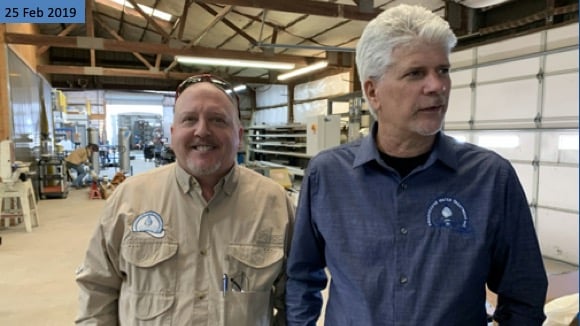
Repeat Customers
Tom: There he is. That's Mike in the tan.
Riggs: Right.
Tom: Mike Jenkins is the man, he's our president of sales. There's Marc Stevens on the right, in the blue and he's our president and general manager down in Texas. He's been running that business for 25 some odd years now. And as people may or may not know, this was a father, son business, his father actually had run the business previous to him so they have well over 40 years at this location just doing the stuff. And that's a lot of-
Riggs: And the deals they're doing are based on long-term relationships.
Tom: Yeah, really long-term. And they go a long way because it's not just, we had the commercial, we had the industrial and municipal, and then we deal with cities, power plants, government agencies. There's a lot of various people.
And the water industry is an interesting cohort based group where people know and they remember, and they reach back out and they call Mike and they call Marc and go, "Hey, I really need this piece of equipment, let's talk about it." And so sometimes we tee it up, it might take us a year, half a year, three months to get proposals done and then we get dropped in a purchase order. In this case, Mike has always been diligent in following up with everybody on some work that we've done in the past, over the years, and a reorder, so to speak from a good client
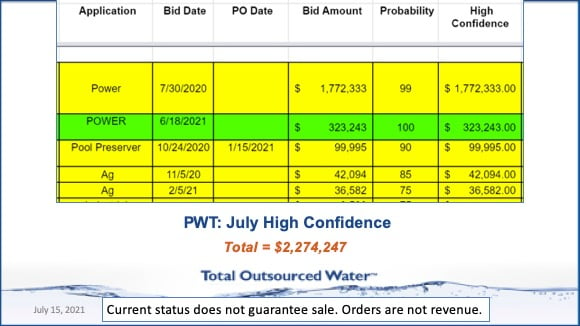
A Lot of Business
Riggs: Here's our July high confidence, there's a lot more of this, but we're going to talk about the first two specifically in a moment, but we're getting some interesting Ag stuff and a lot of business... Progressive Water's always had a lot of power plant business. And then this Pool Preserver™ is something you've been working on for a long time so that's interesting too.
Tom: Yeah. That's a challenge, interesting industry dynamic because it's such a different end market with the customer base there, but great piece of equipment, so fun.
Riggs: I'm glad that it's not $100,000, but 99,995.
Tom: I did that. I put that price in because I was, "I want to incentivize this thing to the... I've got to get it under a hundred K," so I threw it down there, I had to do it. I want the deal.
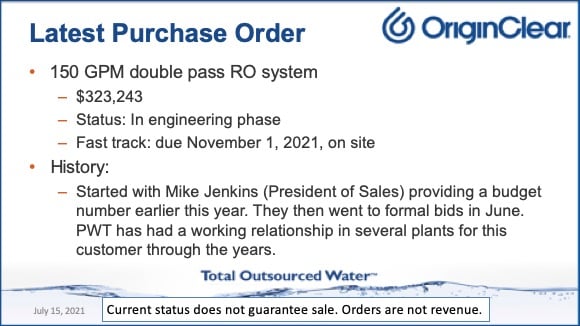
The Perfect Order
Riggs: Let's get specifically into it. This is the latest PO and so this is reverse osmosis, which is what they do is, how do you get salt out of the water? You do is you push it through these amazing... It's a filter, but I don't want to get too deep into it. 150 gallons per minute, double pass. Now, what does that mean, double pass?
Tom: Is means you push it through twice. Basically a two pass means you basically pass the water through the machine two times and you basically ultra purify it. Basically the first pass is a roughing filter and then the second pass is more of a polishing, to get the nano filtration aspect.
Riggs: Yes. And this has gone relatively fast for these large systems. It started earlier this year so they've been fast tracked. This is all going to happen, beginning to end, in one year, which is pretty amazing.
Tom: Yeah. That was a really good one. A very excellent example of what I would consider the perfect order. If you want to think about bread and butter type work that is consistent for 25 years, actually, and the types of machines that we do really very well for commercial industrial clients, that is very accurately a perfect example of something we enjoy doing beautiful.
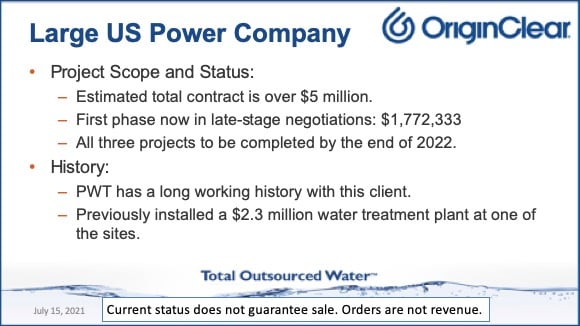
Multiple Stages
Riggs: So then, the other shockingly incredible one is this one that's...
Tom: Ah, yeah. Yep. Power plants are a big piece of our business, there's a lot to do there so when we get orders from them they have a lot of needs because they're doing industrial process, which means there's multiple stages of a water process they're trying to deal with. In this one, we'll receive an order for multiple pieces of equipment.
And so in this case, you'll get the ultra filtration compete, you'll get the reverse osmosis machine, there'll be an EDI, which is the electro-capability, and we'll need some storage tanks and then we put a nice BroncBoost™ to it, boost the pressures.
Riggs: Boost the Bronc.
Tom: Yeah, exactly. When you add all that stuff up, they come together for a lovely price tag, dun dun dun, 1.7 million.
Riggs: And that's just one of the sites, right?
Tom: That is correct, that's one of the locations and it we will be beginning on that one first. And then there's three locations that need similar yet slightly different equipment, little, slightly different pricing between each of them.
We'll stage our way and phase our way through them where we'll begin, we'll then be into designing and building on one while we'll then start on some of the design on another one and then we'll complete one, move on to the next one. It'll just roll its way long.
Fundamental Change
Riggs: I want to put this in context because Progressive Water, for years now, has done about a million dollars a quarter. Here we have over $2 million in one month of predicted business and there's more, that's less sure so we're not showing that. And than on top of the Modular Water doing almost a million dollars in June and with a similar... I think we've had a change in our business, would you agree with that?
Tom: Yeah, there's a fundamental change in our business and doing business. It's been very good. The market's been very positive towards us and the truth is this infrastructure stuff coming down the pipe is important and I think it's got people aware. Companies are putting in the investment now. I think maybe they're just going through a cycle where they're letting contracts as well. It's all happening at once. It's the perfect storm for us.
Urgency
Riggs: It takes us from about a $4 million run rate to about a $30 million run rate if you count Modular Water. Now, not, again, I'm not making a formal forecast because we've got an entire rest of year to go. And the early part of the year was not that high, but we've seen a pop. And why do you think people are so urgent now, aside from just infrastructure being important?
Tom: Well, there is urgency in the sense of there's very few companies like ours who do the work that we do at the quality we do for these end markets and we're American so there's been a change. COVID was an interesting change plus some of the administration change where the buy American made is a big piece of what people are trying to order.
You can only go to so many vendors for what we're doing and fabricator manufacturers. We happened to be one of those groups and we have a proven track record so that's a plus.
Infrastructure Aging
But the other thing is that there's an actual change taking place in infrastructure aging and they just get to these moments in time where I think they were holding out too long, maybe on some repair and replace and the time's up and I think COVID made it strange a little bit longer than it should have been. And now they've got to it so here it is, let's take it, let's go.
Supply Chain Factors
Riggs: Now there's supply chain issues and potential price increases going on, is that a challenge?
Tom: Yeah. It is a real challenge. It's a real issue, it is no joke. I sent out an email to folks just talking to folks about order a little earlier, plan for some delays. Getting things like basic pumps actually is taking longer than usual, getting filters is taking longer. Steel prices went up, copper prices went up. These are real impacts, they are not short-term
Tom: That's either these or... They're going to be with us for a little while. We have to really be... very good about our parts ordering and smart about making sure that we communicate properly to our channel.
Riggs: And put deadlines on the quotes.
Tom: Yeah. We're doing the best we can on some things. We've had a few situations where just complete real delays on a couple of things that normally wouldn't have been there before. And we were surprised but it's impacting everybody. It's not just us. It's happening all over.
Buy American and ESG
Riggs: Well, it is good news because we are this new breed company. Paul Fletcher asks, "Are state or local governments required to buy American?" I think it's true. But we're not just talking about state and local governments here. We're talking about corporations, businesses. They, too, are starting to buy American, am I right?
Tom: Yeah, they are. So, it's a combination of buy American plus the ESG trend. So, what happens is, the buy American thing, you have the federal government level, even Joe Biden's on television saying, "Buy American."
But there's not a... You can't force that. So, where it gets forced, if you want to call it, is when they get into any kind of municipal projects, right? Because when things go to bid or RFP, then they have preferred vendors or people who are allocated or okay to work with.
You add now the ESG stuff, which we talked about, which is the environmental, social, and governance topic. And this gets into governance issue of, did you buy American? Did you buy in a place which is a clean factory who doesn't pollute where they're making the equipment? Right?
Because what good is it to save 10% by buying something in China and then you just get a product back that's... Maybe it's okay, but it was made with slave labor or something that you didn't really want, right? So, you have a lot of stuff like thats actually coming together for real. And driving this as well.
Really Good People
Riggs: Beautiful. Well, Tom, this is really great news. I know you've been working incredibly hard on this for years now.
Tom: We've all been working on it. We've all done it.
Riggs: Pushing that boulder. But no, the team is great. But I think also just sustained attention always pays off. So, thank you very much.
Tom: Well, I appreciate it. We have a great company with some really good people here and I really feel like we're getting momentum as you know, Dan came and visited with us the other day and... He's excited.
It's fun to see guys who've been working for decades, right? In the industry. Motivated and excited about their own products and their opportunities, because that's a good telling thing, right? It's not just something that's hyperbole. He's feeling it. He's got the juice. It's fun to talk to him. He's motivated. So as the guys at Texas. It was a good meeting.
Riggs: My friend. Thank you very much. I'm going to let you go back to your family stuff in Michigan.
Tom: Yeah, buddy.
Riggs: I really appreciate you jumping in.
Tom: Have fun. Bye.
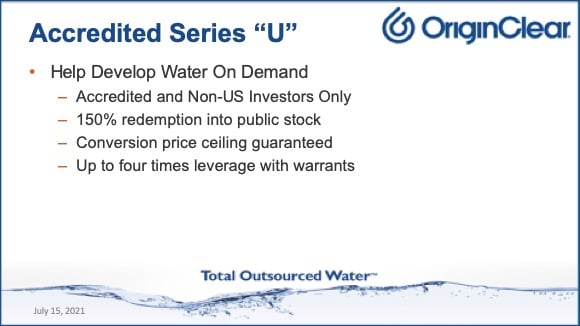
Series U
Riggs: All right. So that was wonderful. And so, now I'm just going to wrap up with a couple other slides here. Sorry. I was going the wrong way. There we go.So, again, remember that we have a current placement that's going extremely well to help develop the water demand program. By this, I mean that we have to... For example, get very good at doing this water as a service stuff. It's a managed service, right?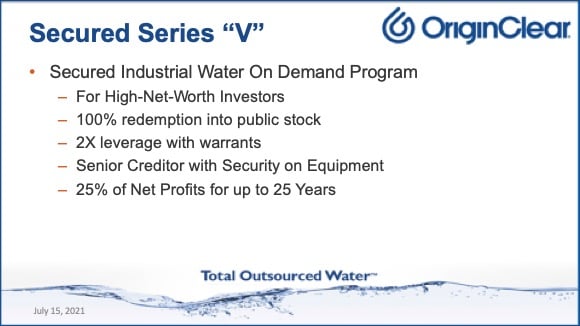
Series V
Well, Texas, right now, is set up to design and build, but not operate. So, we got to get good at that. That means investment. And of course, we need to develop the billing systems and all that good stuff. So, that is important to continue with. And it's a very good offering that's popular right now. And then, there is this Series V, which is people investing, technically a million dollars.
Although, we're working on some flexibility with that. But it should not be... We're not going to have smaller investors in this because it's a more conservative play. It's not as high... A warrant leverage. Warrants is basically guaranteed future pricing. That's all that means.
But why is it important for more conservative investors? Because of the senior creditor status that we are designing into this. And share of the net profits for up to 25 years, which adds up, as you saw.
About a month ago, I showed the spreadsheet and a $20 million investment generates about half a billion dollars in revenues and proportionate net profits. And then, with this digital currency, we have a way to potentially accelerate that payout for the investor, so he doesn't have to wait 25 years to be determined. But we're working on that. And that is something that's very exciting.
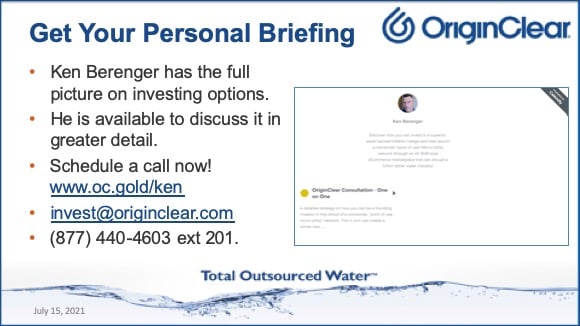
Call Ken
Ken Berenger has a few minutes in a day. [inaudible 00:38:05] He's a one-armed paper hanger. He's amazing, working very hard. And you can schedule any time with him on osi.gold/ken. And he will answer all your questions. And finally, email and invest at originclear.com.
Quarterly Filing
Now, I didn't do a slide on this, but I wanted to mention that, right now, we are once again, dealing with a delayed quarterly filing. It is imminent that we will file, but because it was delayed, it's causing some ripples out there in the trading world. And we recruited a very able CFO who is putting in processes to ensure that the Q2 one, which is due 15 of August, very quickly after that, is not as delayed. So...
It is not something that's pleasant because it... Well, it's just not great PR. Let's put it that way. But the filing is on its way. It will happen soon. And if you have any further questions, please email invest@originclear.com. And Devin and myself will be happy to answer any further questions about it.
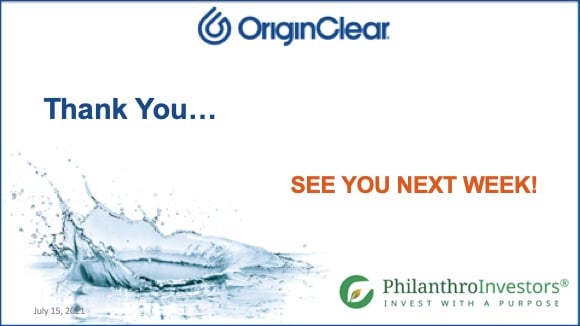
Next Week
So, next week, we're going to cover the PhilanthroInvestor ambassadors topic more. I covered it briefly at the beginning of this. It's a wonderful program of people who are bringing us a lot of...really capital. I think, if it weren't for PhilanthroInvestors, we would not be able to build this $20 million capital fund.
It's not to say that our own investors aren't going to come in, because we do have some coming in, but I've been in this team... Really have the scope and the vision to make that happen. And there's no way you're going to do outsourced water treatment without capital. And that's where this is at. And it will also lead, one of these days, we think, to the NASDAQ.
More on Q1 Filing
So, that's it for tonight. I really appreciate you spending time with us and Bob Roos, I hope I gave a sufficient update... Just to very specifically say that it's looking like... Well, I'm going to just play it safe, and say some something like, by the end of the month, but we're working on making it earlier than that.
The 23rd is a Friday. So, sometime that following week, is when I think it will happen. Again, I can't give guarantees, but it is happening. Prasad is hard to work on it with Eric and all the rest of the team, Gwen, the auditors.
And what caused it was this extraordinary amount of creativity we used to got into, which was good for investors on all these offerings and exchanges, but it completely discombobulated our reporting process. It was... Just 18 simultaneous sets of preferred shares is a record. And so, we are putting in the systems software, top personnel, and it's not going to happen again on my watch. That's for sure.
So, thank you, Steven Davis. Thank you, Riggs. Great meeting. And I appreciate you all coming. Let's have a great weekend. Do come next time and I'll be covering again the PhilanthroInvestor ambassadors program further with our friends, Ivan and Vendy, and maybe even Arte, the cool Arte Maren, who I've known for quite a few years. So, thank you all and have a good night.
Register for next week’s Insider Briefing: HERE
%20250px.png?width=250&height=53&name=OriginClear%20Logo%202019%20(RGB)%20250px.png)




